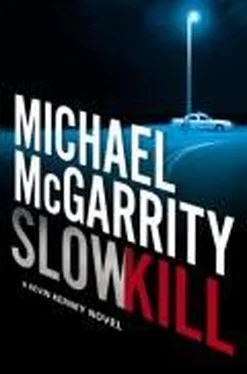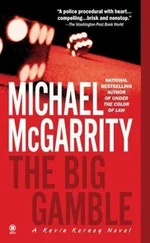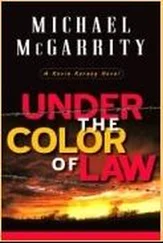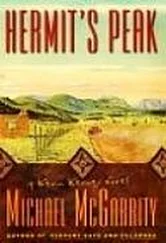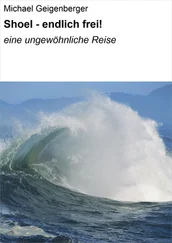Michael Mcgarrity - Slow Kill
Здесь есть возможность читать онлайн «Michael Mcgarrity - Slow Kill» весь текст электронной книги совершенно бесплатно (целиком полную версию без сокращений). В некоторых случаях можно слушать аудио, скачать через торрент в формате fb2 и присутствует краткое содержание. Жанр: Триллер, на английском языке. Описание произведения, (предисловие) а так же отзывы посетителей доступны на портале библиотеки ЛибКат.
- Название:Slow Kill
- Автор:
- Жанр:
- Год:неизвестен
- ISBN:нет данных
- Рейтинг книги:3 / 5. Голосов: 1
-
Избранное:Добавить в избранное
- Отзывы:
-
Ваша оценка:
- 60
- 1
- 2
- 3
- 4
- 5
Slow Kill: краткое содержание, описание и аннотация
Предлагаем к чтению аннотацию, описание, краткое содержание или предисловие (зависит от того, что написал сам автор книги «Slow Kill»). Если вы не нашли необходимую информацию о книге — напишите в комментариях, мы постараемся отыскать её.
Slow Kill — читать онлайн бесплатно полную книгу (весь текст) целиком
Ниже представлен текст книги, разбитый по страницам. Система сохранения места последней прочитанной страницы, позволяет с удобством читать онлайн бесплатно книгу «Slow Kill», без необходимости каждый раз заново искать на чём Вы остановились. Поставьте закладку, и сможете в любой момент перейти на страницу, на которой закончили чтение.
Интервал:
Закладка:
Beyond the canyon, the Galisteo Basin stretched out to meet the Ortiz Mountains, which tumbled against the higher peaks of the Sandias, a good fifty miles distant. Behind the house, a swath of pine-studded pastureland rose up a hill, framed in the background by the Sangre de Cristo Mountains outside of Santa Fe.
In Spanish, Sangre de Cristo meant “blood of Christ.” Tradition had it that the mountains were so named by the Spanish settlers because of the deep red color that washed over the peaks at sunset. To the native people who had lived at the foot of the mountains for hundreds of years before the Spanish arrived, they were “the place where the sun danced.”
To Kerney, both names perfectly described the mountains. At times, he’d seen a deep mahogany-red color tint the peaks, and on certain monsoon days had watched shafts of sunlight flit like nimble waves across the rain-darkened range. One night he’d stood in awe as the full moon rose, backlighting a bank of clouds behind the mountains, creating a creamy white mantle that draped down to the foothills.
With Sara and Patrick on the other side of the country, Kerney filled his free time with home improvement projects that kept his hands busy and his mind occupied. His latest undertaking was a rock wall that, when finished, would enclose a long planting bed on the east side of the house. He’d bought a truckload of flat landscaping rock from a quarry and was teaching himself how to cut, fit, and dry stack the stone to create a three-foot-high wall. So far, he’d trenched the foundation and leveled the grade. Now it was time to start laying in the largest, widest stones as the base course.
He arrived home, changed into jeans and a long-sleeved shirt, and started working up a sweat in the late afternoon sun. He’d planned the wall to curve and join up with the end of the south-facing portal, and he found that cutting the stones to make the bend was no easy matter.
He stood up to get another rock and saw a car enter the ranch road through the meadow and move up the hill. Even from a distance Kerney could see it was an unmarked police unit. The make of the vehicle, the spotlight mounted on the driver-side door, and the two trunk-mounted antennas were dead giveaways. But he didn’t have any idea who the driver might be.
At a hose bib, he splashed water on his face, wiped a sleeve over his damp, matted hair, put his cap back on, and walked to the car as it slowed to a stop in the driveway.
Agent Joe Valdez got out and walked to him. “Building a wall?” he asked as he shook Kerney’s hand.
“Trying to,” Kerney asked. “What brings you out to the boonies?”
“I’m driving down to Carlsbad for an early morning meeting,” Joe said as he walked over to the line of rocks Kerney had laid. “Since you’re on my way, I thought I’d stop by to tell you what I’ve learned about Clifford Spalding.”
Valdez knelt down and studied the partial line of rock Kerney had placed in the trench. “Are you planning to dry stack or use mortar?”
“I plan to dry stack,” Kerney said.
“How high is the wall going to be?” Joe asked as he jiggled a stone to test its stability. It was firmly placed.
“Three feet,” Kerney replied.
Joe shook his head and rose. “Your foundation is too narrow. You’ll need to double the size of it.”
“You know about this stuff?” Kerney asked.
“My grandfather was a stone mason,” Joe said, with a nod of his head. “I used to work for him in the summertime. Will it be a free-standing or a retaining wall?”
“Retaining,” Kerney said. “I’ll backfill it with topsoil and eventually put in a flowerbed and a flag-stone path.”
“You’ll need to slope it for drainage, otherwise it will give way over time,” Joe said as he walked along the empty part of the trench. “That’s one of the reasons your foundation has to be wider, so you can step it back a bit and still have support at the base.”
“Should I start over?” Kerney asked.
“I would,” Joe said, glancing at Kerney’s rock pile. “And you might want to order more rock. You’ve only got half of what you’ll need.”
“Thanks for the advice,” Kerney said.
“That’s about all the help I can give you,” Joe replied with a smile, “because this thing with Clifford Spalding is a washout. There’s no way I can track down the source of the money Spalding used to buy the leasehold for the Santa Fe hotel or pay his way out of bankruptcy. Nobody keeps financial records for thirty years, unless there are potential litigation issues, and there weren’t any with Spalding.”
“How much money are we talking about?” Kerney asked.
“All together, a little over three hundred thousand,” Joe said, “and none of it came from the life insurance policy on Spalding’s son. That was for ten grand, and the beneficiary was Debbie Calderwood, who cashed it in, according to the insurance company records.”
“Where do you think Clifford Spalding got that kind of money?” Kerney asked.
Valdez shrugged. “One source told me Spalding had no partners. Another, the lawyer who handled the lease agreement for the Santa Fe property, said he had an investor. The state has no record of a partnership contract, so I’m assuming it was an informal, handshake arrangement.”
“Did the lawyer give you the name of the investor?” Kerney asked.
“Nope,” Joe replied. “He didn’t handle that part of it, and Spalding made the first payment on the lease through his personal checking account. Even if I could have found the bank account he’d used, the record wouldn’t be there. Banks only keep checking account information for six years.”
“What about state and federal tax records?”
“You’d need to make a strong case for tax evasion first, before we could access that information,” Joe replied. “Same with bank deposit reports to the feds when the amount is in excess of ten thousand dollars.”
“Did the insurance company have a record of where they sent the policy proceeds to Debbie Calderwood?” Kerney asked.
“Yeah,” Joe replied, stepping off toward his unit. “I’ll get my notes.” He came back and opened a file. “It was sent to general delivery in Taos.”
“Thanks, Joe,” Kerney said.
“Sorry I couldn’t have been more helpful,” Valdez replied. “Good luck with the wall.”
Kerney glanced at his project. He’d put a lot of hours into doing it wrong, and now he’d have to start over again from scratch. “I might as well get it right,” he said.
Valdez laughed and nodded in agreement.
Kerney waved as Joe drove away, thinking maybe his research hadn’t been a complete waste of time. According to Lou Ferry, the PI Clifford Spalding had hired and then fired for failing to continue falsifying his investigative reports, Debbie Calderwood had spent some time in Taos living on a commune before disappearing into southern Colorado.
While the communes around Taos were long gone, many of the old hippies from the sixties and early seventies remained. They formed an alternative lifestyle community of fringe artists, environmental activists, ski bums, building contractors, and reconstructed small business owners.
Kerney decided to pay the Taos police a call in the morning. Given the small size of the town, surely the local cops had to know someone with connections to the old communes who remembered Debbie Calderwood.
It was worth a shot.
He turned to the rock work, and started lifting out the stones he’d so carefully leveled at the bottom of the trench.
Ramona Pino had left Mitch Griffin’s house weighing a question that had troubled her all afternoon. Why had Griffin waived his rights and given carte blanche permission for the search without demanding a deal from the ADA? It made no sense. Surely, Griffin had to know what the cops would find. Was he just plain stupid, or protecting someone or something? If so, who or what?
Читать дальшеИнтервал:
Закладка:
Похожие книги на «Slow Kill»
Представляем Вашему вниманию похожие книги на «Slow Kill» списком для выбора. Мы отобрали схожую по названию и смыслу литературу в надежде предоставить читателям больше вариантов отыскать новые, интересные, ещё непрочитанные произведения.
Обсуждение, отзывы о книге «Slow Kill» и просто собственные мнения читателей. Оставьте ваши комментарии, напишите, что Вы думаете о произведении, его смысле или главных героях. Укажите что конкретно понравилось, а что нет, и почему Вы так считаете.
